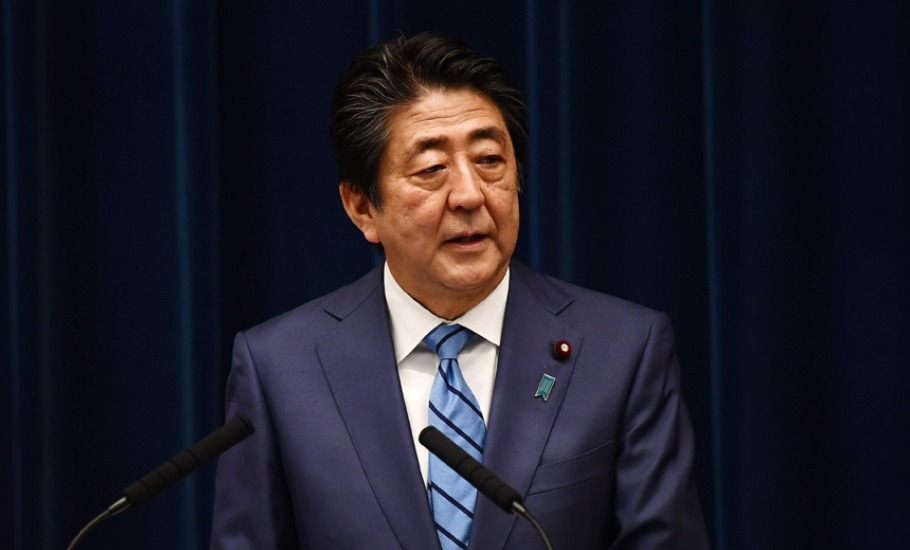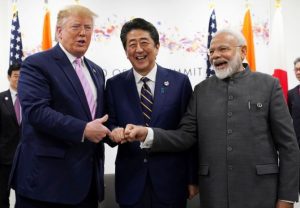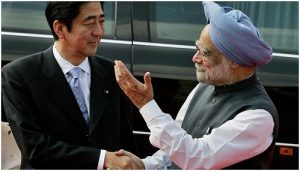
Shinzo Abe: The Japanese PM who pushed for strong ties with India, US
Shinzo Abe was Japan's longest serving premier and and was credited with leaving an indelible mark on the country's foreign policy and defence strategy; he was also responsible for deepening relations with India

Japan’s former Prime Minister Shinzo Abe, who was shot dead on Friday, July 8, was the country’s longest serving premier. He was credited with leaving an indelible mark on the nation’s foreign policy, defence and economic strategy.
During his tenure in office, Abe oversaw a period of relative stability from 2012 to 2020. He raised Japan’s image on the global stage and nurtured a strong alliance with the United States. He was also known for his attempts to revitalise the Japanese economy with his trademark ‘Abenomics’ policies, pumping billions of dollars into Japan’s economic growth, the success of which was a matter of debate.
Also read: Former Japanese Prime Minister Shinzo Abe is dead
Abe’s tenure as PM was a tumultuous one, mired by political controversy and scandals and worsening relations with neighbour South Korea. However, he managed to survive it all.
Hailed from a political family
Born in 1954, Shinzo Abe hailed from a political family. His grandfather Nobusuke Kishi was prime minister (1957-60), while his father Shintaro Abe was foreign minister (1982-86).
Abe graduated from the department of political science, faculty of law, Seikei University and entered Kobe steel in 1979. In 1982, he became the executive assistant to the minister for foreign affairs and in 1993, he began his political career in Japan’s lower house of Parliament.
Abe’s foreign policy
“Japan is back,” declared Shinzo Abe in a speech during a visit to the US in February 2013, shortly after he became Japan’s PM for the second time. His first stint at the helm in 2006 only lasted a year, cut short both by health problems and political controversies that diminished his popularity.

Abe had always pitched to work closely with “like-minded democracies”, such as the US, India, Australia and South Korea.
Abe also established a base for regional security cooperation along with the US, Japan, India, and Australia under the Quad, claiming that this framework has been, and will be, an important asset for the peace and stability in the Indo-Pacific.
He became the first Japanese prime minister to visit Pearl Harbor accompanied by a US President, when he visited the naval base with then-President Barack Obama, in 2016. He was an “unwavering” ally of the US.
 Also read: Padma Vibhushan for SPB, Shinzo Abe; Chitra gets Padma Bhushan
Also read: Padma Vibhushan for SPB, Shinzo Abe; Chitra gets Padma Bhushan
Relations with India
Abe was responsible for deepening relations with India, both on the investment front and through stepped up security cooperation under the Quad. Although some initiatives, such as the bullet train corridor, did not take off.
Deeply distressed by the attack on my dear friend Abe Shinzo. Our thoughts and prayers are with him, his family, and the people of Japan.
— Narendra Modi (@narendramodi) July 8, 2022
At an Indian Council of World Affairs (ICWA) lecture in September 2011, Abe had said: “a strong India is in the best interest of Japan, and a strong Japan is in the best interest of India.”
In 2007, Abe became the first ever Japanese PM to address a joint session of Indian Parliament. At that time, he narrated the story of how India’s first PM Jawaharlal Nehru hosted Abe’s maternal grandfather the then Japanese Prime Minister Nobusuke Kishi in New Delhi in 1957.
Nehru introduced Kishi at a public reception thus: “This is the Prime Minister of Japan, a country I hold in the greatest esteem.” It was rare in the aftermath of the Second World War for a Japanese PM to be felicitated such at a public rally and that too by a leader of Nehru’s stature.
Abe reminisced at his 2011 ICWA speech about how deeply Nehru’s gesture had touched his grandfather. Abe said: “As a young boy seated on his knee, I would hear him telling me that Prime Minister Nehru introduced him to the biggest audience he had ever seen in his lifetime of a hundred thousand people. He told me that it was India that came forward before any other country to accept the Official Development Assistance (ODA) Japan wanted to extend as a proud member of the international community. For all that, he remained deeply thankful throughout his life.”
Notably, he was the first Japanese PM to be chief guest at India’s Republic Day parade in 2014. Last year, Shinzo Abe was awarded the Padma Vibhushan.
Also read: Japan prime minister Shinzo Abe resigns due to poor health
Controversies
One of Abe’s most controversial moves while he was in power was to revise Article 9 of the Constitution, which stipulates that “the Japanese people forever renounce war as a sovereign right of the nation”. This article had been added to the newly-minted Japanese Constitution after the end of the Second World War and forbade the country to maintain an army, navy or air force.
His attempts to modify the country’s pacifist post-war constitution was unsuccessful but under his watch Japan amended laws that will allow its armed forces to be deployed overseas and the military for the first time took part in exercises on foreign soil. He is also credited with strengthening the country’s military by bolstering defence spending.
Plagued by scandals
Though Abe had been praised for amplifying Japan’s profile on the world stage, his party was plagued by scandals and Abe was accused of using his position of power grant favours which resulted in protests in early 2018. He was accused of mishandling the country’s response to the Covid-19 pandemic.
Abe’s resignation in 2020 came amid a worsening of his ulcerative colitis, a chronic bowel condition he’d battled for years. He was succeeded by his close party ally Yoshihide Suga, who was later replaced by Fumio Kishida. But Abe continued to be an influential figure in the ruling Liberal Democratic Party (LDP).
The elections for the upper house of the Japanese Parliament were to be held on Sunday. Abe, 67, was campaigning for other members of the governing conservative Liberal Democratic Party (LDP) but is not a candidate himself, when he was shot at. He died in hospital after battling briefly for his life.

